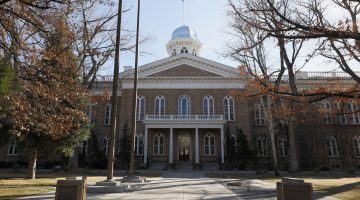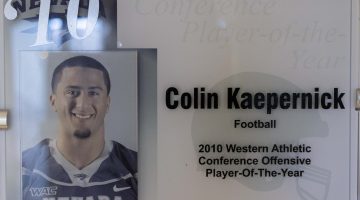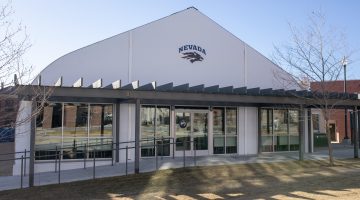
Olivia Ali/Nevada Sagebrush
President Marc Johnson delivers the State of the University Address on Wednesday, Sept. 26. The address focused on people, partnerships and the power of big ideas.
President Marc Johnson gave the annual State of the University address in the Glick Ballrooms in the Joe Crowley Student Union on Wednesday, Sept. 27. Johnson addressed goals of the University of Nevada, Reno, for the upcoming years regarding expansion, innovation and more.
President Johnson highlighted three themes — people, partnerships and the power of big ideas.
Johnson defined people as university graduates that “modernize and diversity the economic, agency and cultural base of Nevada”. He defined partnerships as the university intentionally opening “its doors to work alongside businesses and cultural groups to create new opportunities in Nevada”. Lastly, he defined the power of big ideas as the “university’s capacity to create new ideas, knowledge and innovation” as being a “cornerstone of the entrepreneurial transformation we are witnessing in our community”.
The investments in these three components are what Johnson identified as the causes of impact at the university.
“Intentional university investments in people, partnerships and big ideas over the last several years are maturing and generating dividends,” Johnson said during the address. “All of this impact is a result of the efforts and creativity of the people at our university and in the community.”
Johnson announced that enrollment had flattened for the 2018-2019 school year due to the record number of graduates in the 2017-2018 school year — 4,930 in the last academic year. However, the university currently has more than double the number of minority students that it did 10 years ago. Nearly 20 percent of the student body is of Hispanic or Latino background.
“The undergraduate population reflects the demography of Nevada with more than 38 percent associated with underrepresented ethnic groups,” Johnson said. “These 8,200 students from underrepresented groups are more than double the number of a decade ago. This increased diversity of our student body provides a rich opportunity and responsibility to adjust university staffing and operations to reflect the changing composition of our student body.”
At the 2017 State of the University Address, Johnson announced that a goal of the university was to become a Carnegie R-1 institution. At the 2018 address, Johnson announced that the university was working toward this when it saw a 6.9 percent overall increase of graduate students. In addition, new master’s students are up 7.6 percent, total doctoral students are up 13.5 percent and new doctoral students being up 29.8 percent.
“With 951 doctoral students, we are rapidly closing in on our 2021 strategic plan goal of 1,000 doctoral students,” Johnson said.
Other than the number of graduate students rising, the university is working toward the Carnegie R-1 classification by increasing innovation and research among the university’s programs and colleges.
“The university has grown its research expenditure portfolio to $144 million. The projected R&D expenditure amount to be reported to NSF has grown to $118 million, $23 million more than just two years ago,” Johnson said.
Johnson announced that about 75 percent of graduates are staying in Nevada to work and live after graduation according to the latest graduation survey. According to Johnson, they are the “entrepreneurial leaders our state will rely upon”.
The university has been titled a “top tier” university among the nation for the ninth straight year according to the U.S. News and World Report ranking.
Johnson credited retention rates and an increased 4-year graduation rate — 37 percent compared to 23 percent only five years ago — to programs such as NevadaFIT, orientation, First in the Pack and the Center, Every Student Every Story.
Johnson also announced the expansion and innovation of programs such as the InNEVation Center and the Nevada Center for Applied Research.
The InNEvation Center has only been open for three years but has become “a catalyst for regional enterprise, and is empowering our next generation of technology and business leaders,” Johnson said.
The Nevada Center for Applied Research has become responsible for grants, innovation and jobs.
“Since its inception in 2015, NCAR has been responsible for more than $15 million in grant proposals and gifts and has contributed to the creation of 108 jobs,” Johnson said.
Johnson concluded by addressing diversity challenges the university has faced in the past academic year. These challenges included a university student being the public face of the Charlottesville protests, an “inappropriate” traffic stop, the rescission of Deferred Action for Childhood Arrivals, painting of swastikas on campus, sexual harassment incidents and other microaggressions.
“Had these incidents occurred at another university, we might have been satisfied showing empathy for what happened there,” Johnson said. “But this was not another university; this was here. We did not always respond well, and certainly not to everyone’s satisfaction, and some of the conversations were uncomfortable. As I reflect back on last year, I believe this institution has benefited by being ‘in the arena’. We take the lessons learned from last year and commit to do better. We do this with the purpose of letting our students, faculty, staff and community collaborators know that they all have a place here, that they all belong here, at this university.”
After the sudden resignation of Diversity Officer at the end of the last academic year, Johnson announced that the search for a replacement would commence shortly.
“We are also beginning the search for a University Diversity Officer to lead the enhancement of inclusion and equity in our campus culture,” Johnson said. “Our new University Diversity Officer will be an essential leader in helping us take our next steps in building awareness for the issues of diversity, inclusion and equity.”
Johnson closed the ceremony by thanking the university as a whole.
“Thank you all for all the wonderful work you have done for the university and your community,” Johnson said. “And thank you all for what we are yet to experience. Our best is yet to come.”












